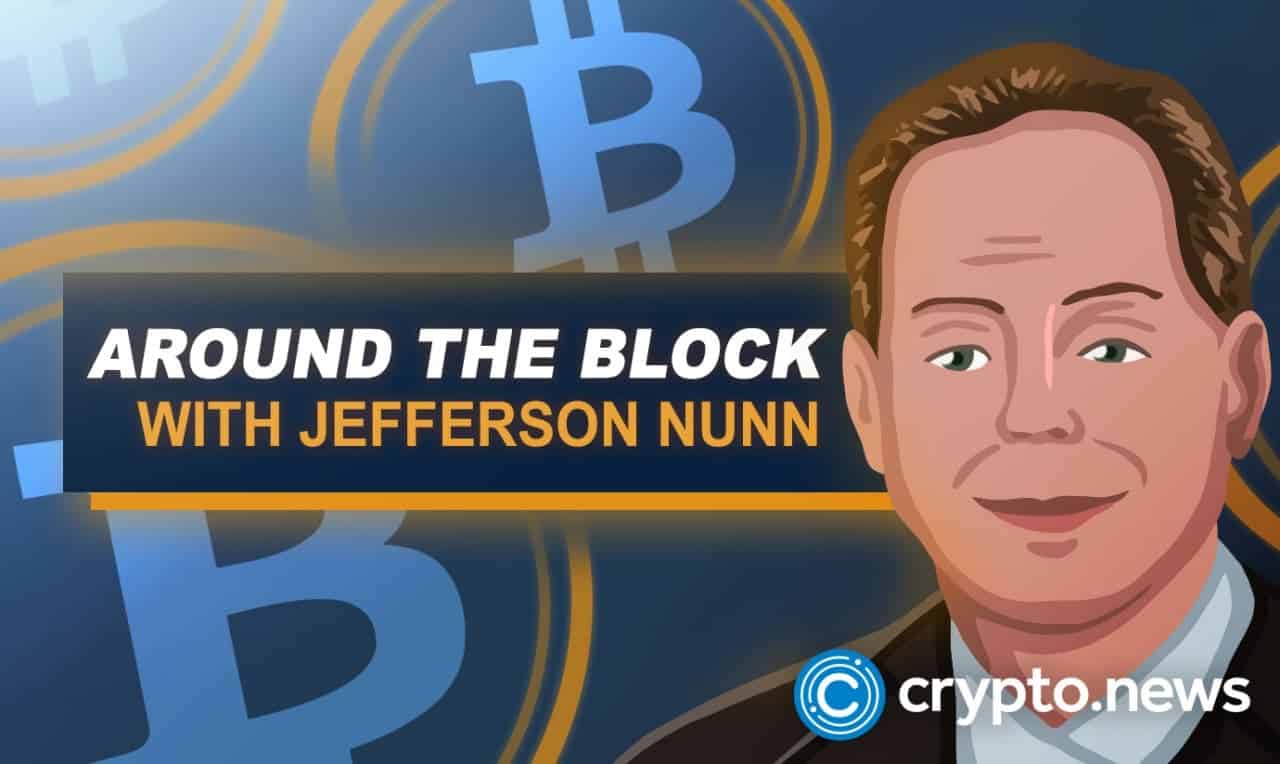Around The Block With Jefferson – Interview with Siddarth at Comdex

Click the link below to listen to the full podcast:
Around The Block With Jefferson Podcast
Podcast Transcript:
Jefferson:
Live from crypto.news Global Headquarters, this is around the block with Jefferson Nunn. And I’ve got some incredible news for you today. Bitcoin is on the rise, Ethereum is on the rise, fees are at an all-time low, at least for the last 12 months. And it looks like this space is finally coming back for investors. And along those lines, there are some tremendous opportunities out there and both decentralized finance and centralized finance. And there’s a company that’s been on a mission to really change that. And I’m here today with the Co-Founder, Siddarth at Comdex.
Siddharth, how are you doing?
Siddarth:
Hey, Jefferson, I’m doing great. Thanks. How are you?
Jefferson:
Great, great. So, it looks like you’ve been on this mission since 2018, to revolutionize DeFi and CeFi. Can you tell me more about what you’re doing and what’s going on?
Siddarth:
Sure. So, we started off in 2018 in the commodity space, the idea in the commodity space was to solve the problem of financing when it comes to access to trade financing in commodities trade for SME and MSME traders and in the Southeast Asia region. So we realized that creating a platform based on blockchain technology would truly enable these SME MSME traders in the commodity space to create that layer of trust that they currently lack in their ecosystem, in order to not only enhance their business and enhance their operator audit trails, and create more transparent sort of trade workflows. But they also have greater access to financing because their workflows are now more transparent and visible. So that’s the application we first launched, which was an enterprise-focused trading application. And on that application, we have around 18 organizations that use that at the moment, incorporated in Singapore across Southeast Asia. So we have Singapore, Hong Kong, Malaysia, and UAE. And we have covered over $150 million worth of trade volume on this platform.
So, what this platform does is, it enhance the MSME, SMEs access to financing. So as we went on this journey of building out this application between 2018 and 2020, we realized that there are multiple ways we can address this problem of financing in the commodity space. And one such solution was obviously our enterprise to a platform that we built. But we thought we could supplement this access to financing by creating more avenues to liquidity. And one such Avenue at the time was the DeFi space itself booming through 2020 and 2021. So, we saw this as an opportunity not only for DeFi investors to be able to access asset classes that they typically didn’t have access to before but also provide liquidity to stable assets in the real world which historically has a very safe profile in terms of default rates, and are able to provide long term stability when it comes to cash flows itself.
So, we realize that on the DeFi front, it’s giving different investors access to stable yields. And on the centralized financial the traditional finance front, it’s allowing the traditional players to access financing from a whole new realm, which is the Sci-Fi sphere, and bridge this liquidity. So that’s sort of what we’ve been working on in the past year all of 2021. And now, we’re launching a synthetics protocol, which is going to enable its users to use the crypto assets as collateral and be able to take exposure and multiple commodity-based synthetic assets.
For anyone who doesn’t know synthetic assets, they’re essentially derivative assets on the blockchain. So essentially, their tokens derive their value from values of other assets, which may be on other chains or in the real world, for example. And these are tradable tokens that can trade within a closed market or ecosystem of players who interact in the sphere. So we are now currently working on the synthetics protocol, which should be coming live in early Q2 of this year. The test net for this should be coming live in a couple of weeks’ time.
So that’s when users will fully get to use this protocol while they’re able to convert or use our crypto assets as collateral and take access to multiple different assets, whether they are commodity Synthetic, so they could be real-world commodities financing opportunities.
Jefferson:
Which I think there is a lot. I’ve already been seeing here and there, people working on a solution to take some real-world assets, whether they be sports memorabilia, or even houses, think you could be a fractional investor and a housing project, for example. Is your solution, something that would be applicable to that kind of space?
Siddarth:
Absolutely. There’s definitely scope for something like that. So, I’ll just give you sort of paint a picture by giving you an example of how this applies and the traditional space. So today, a lot of commodities trading volumes that we see happen across the globe tends to happen or operate on credit cycles of 60-90 days are often even 180 days. So typically, suppliers who await payments for the 60 or 80 days working on tight working capital requirements, generally have financing requirements. So today, the way they do it is they go to banks or financial institutions, whether there is financing requests and go through a long process of verifications before they’re finally approved, if they are approved, what we want to do is create an interface where the same financing request by a single commodities trader or a group of commodities traders for multiple transactions can be funded by again, a group of DeFi investors, all fractionally or partially taking ownership on the debt itself over the cycle that it’s due for.
Jefferson:
That’s really incredible news. Because I think that’s a space that had a lot of interest. But, they just have not been able to get a lot of traction, because of like you say, the lack of these types of tools to be able to gain entry into that space. So, one thing I noticed is that which is great, you’re on the cosmos protocol. I’m just curious, were there technical or business reasons that you chose that protocol?
Siddarth:
Yes, a bit of both. So on the technical front, you know, as I said, we started building in 2018. And we always sort of had the vision to be a proof of steak-based chain. And at the time building in 2018, building on tender mint was sort of the gold standard for any sort of proof of stake chain. So that’s why we stuck with the cosmos. And you know, between 2018, and now, the ecosystem itself has been tremendously supportive, supportive of us. And that’s what has been one of the large reasons for us continuing to be in this ecosystem. But in addition to that, just tying back into our original vision, which is to create a bridge between DeFi liquidity and traditional finance, that the way to truly tap into defy liquidity is to tap into defy liquidity existing across all ecosystems. Today, there are multiple sort of defy ecosystems flourishing across various protocols. So you have an entire DeFi ecosystem on Ethereum, you have it on avalanche as well. So what we’re looking to do is create bridges firstly, within the defy space, so that that seamless flow of capital across ecosystems and across DeFi protocols, and then ultimately also have a bridge to traditional finance, which will ultimately be the true bridging of DeFi and SiFi as we call it.
So, in order to achieve this interoperability of all of all these applications and protocols is a key to being able to achieve all of this. And that’s also something central to cosmos vision about how it sees its ecosystem being building out. So, that’s something we align with. And that’s also part of the reason why we’ve chosen to stay safe in the cosmos ecosystem through through the years and we’ll build out.
Jefferson:
That’s awesome. Circling back to the issues with DeFi, one of the things that we’ve seen over the last couple of years is that there has been everything from just straight out synthetics tolls to sometimes somebody making a coding mistake, and there’s an issue. Can you tell me a little bit more about how your system might reduce that kind of a problem?
Siddarth:
Sure. So, as is the case with a lot of financial investments and finance in general, speculation is involved when it comes to dealing with derivatives and so the same is the case with synthetics as well. So synthetics is a tool that can be used for hedging speculation and leveraging all of which implies that there is a potential downside, which can harm the owner of that position or of that asset. So there’s always a potential for market volatility is to sort of have an impact on the way people behave in the markets and how it impacts their assets. But, the way we are working towards safeguarding against that is by taking the collateralization path where we believe when synthetic assets are backed by crypto as collateral, they should also be backed by certain over collateralized positions to absorb volatility in the market and remain solvent. On the technological front as well, we were applying for security audits with multiple reputed organizations at this point, once the audit is complete, we will obviously be publishing these reports for to the community for everyone to have, you know we went to other than that, you know, these are primarily the main sort of risks that one faces in this kind of space.
Jefferson:
Yeah, that’s great. I’ve been seeing even Binance putting together an insurance fund, if you will a billion dollar insurance fund. So I think there’s a lot of action that different companies are taking to provide more assurance that this space is and I would argue, is definitely more stable than trying to invest in something like Gamestop, Oh my God. But yes, this is fantastic, I think, way to grow this space.
If somebody wants to get involved, how can they get involved with your project?
Siddarth:
So, I think the best way to find any information about Comdex at this point is the first place to go to its website, which is comdex.one
From here, you should be able to navigate easily to our white paper, to our documentation to our GitHub. And then further you can get in touch with us through our Twitter as well as our Telegram community chat. We have a very active community on Telegram where a lot of the community folks are getting involved and helping others out in terms of understanding and being able to use the protocol as well. So, I think these are the best ways for anyone to get in touch and get involved if they’re looking to get involved in Comdex today.
Jefferson:
Awesome, awesome. Just one more question, I’m curious. How did you first come to learn about Bitcoin or cryptocurrency?
Siddarth:
So, I actually come from a background in traditional finance, I’ve worked in wealth management and investment banking myself. So in late 2017, in the previous Bitcoin bull cycle, when we saw the price grow close to $20,000, I had a few friends at the time who were quite involved in the crypto space, and I was very closely in touch with them at the time, because this is a space that intrigued me. And then through them, I sort of learn the space and then also obviously also saw the kind of returns they may have done on their investments. So, these are the two reasons that kind of drew me to the space. One was the curiosity and the other was the lucrative nature of the space.
Jefferson:
That’s amazing. I’ve really been seeing a lot of movement by financial professionals into the cryptocurrency space, which is a very telling story, when all the best and brightest they don’t go through traditional finance, they’re going into cryptocurrency, right. So, I really think that this space is just going to continue to grow, and it’s people like you that are going to grow. So, that’s incredible.
Any final thoughts you’d like to share with our listeners?
Siddarth:
I think just in terms of where we’re at with Comdex right now, for those who are interested to use Comdex as an application to as I said, take exposure and commodities and get their hands on various synthetic assets, we’ll be launching our test net in a few weeks time. So definitely watch all of our spaces for more updates on that. And through the test net, you will be able to get an idea of what the interface will look like and test it out yourself and understand how it works. And then, we’re poised for the main net launch for this application in early Q2 of this year. So, I think the only message here is just to keep your eyes out, and then stay tuned for more updates.
Jefferson:
Very cool. I’m looking forward to the launch, I’d love to circle back with you in about six months just to see how things are going.
Siddarth:
Absolutely, Jefferson. I’d love that too.
Jefferson:
Alright, thank you. Thank you very much.
Siddarth:
Thank you. Take care.














